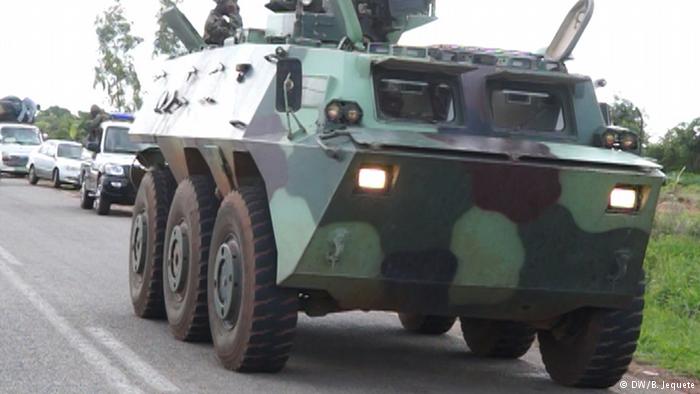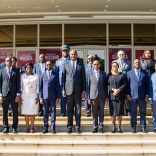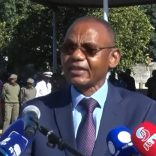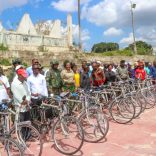Mozambique: President Chapo swears in members of the State Council
Mozambicans ask for more than truce

DW /Military escort at EN7, central Mozambique
Military escorts between Vanduzi and Luenha River in Manica, central Mozambique, were suspended on December 28, 2016, the day after Afonso Dhlakama, leader of Renamo, the county’s largest opposition party, declared a one-week truce, extended for two more months.
But police say they remain “in readiness”.
Elsídia Filipe, spokeswoman for the Provincial Police Command in Manica, central Mozambique, made it clear that the Police of the Republic of Mozambique (PRM) would continue operations on the ground to “ensure order and the safety” of the population, adding that their activities should not be interpreted as being an escort, but as a normal Defence and Security Forces work.
According to Elsídia Filipe, the Defence and Security Forces were “fulfilling their constitutional mandate” and could therefore be deployed anywhere in the country.
She confirmed that “there are no more escorts; people are travelling normally, at any time”. She went on to say: “We, as authorities, have to remain on the alert. We have stood the escorts down, but we are not forgetting that this is a provisional measure, and will continue to patrol to prevent and combat crime, not only on that stretch of road, but throughout the province.”
Filipe added that “people should not feel intimidated because the police are doing their job”.
Passengers interviewed by DW Africa in the Vanduzi district meanwhile called on government officials to strive for an effective and lasting peace in Mozambique.

Mozambicans demand lasting peace
Felisberto Ananias said he was very pleased to be able to travel without military escort and without attacks during the trip. He praised the government and Renamo for suspending the attacks, but called for an acceleration of the dialogue aimed at ending hostilities. “This is what we wanted – to travel freely without escorts. Let us travel without problems and without depending on the military escort. We will not wait around for the column [military protection].”
“We waited here, hungry and exposed to the sun for the columns to form. As soon as the leader of Renamo extended the truce, we could go about freely as before.”
Ana Maria Gomes, another Mozambican, said she thought the attacks would end permanently, but over time. She called on both parties to engage in a serious dialogue in order to end all military escorts, attacks and kidnappings of party members.
“The escorts and the attacks that occurred during the trip hurt business particularly, because products deteriorated along the way due to waiting time on the road.”

No-one misses the military escorts
Passenger bus driver Simão Pedro Johane said the 60-day truce was welcome and would be a great help for his business. “In fact, we want peace back, because with it we can travel freely, without impediment.”
Johane said that “with the column it was very difficult to get around, especially for us passenger transporters. You see, if we took people in Chimoio at 5 o’clock in the morning and arrived after the column left, we were forced to wait for the next one [convoy]. With the end of the escort system, we can carry passengers knowing that we will travel without stopping”.
Following the intensification of Renamo ambushes on the main roads of central Mozambique at the beginning of last year, Defence and Security Forces imposed compulsory military escorts on EN 1 between the Save River and Muxúnguè and between Nhamapadza and Caia in Sofala, and also in the EN 7 between Vanduzi in Manica province and Changara in Tete.
The center and north of Mozambique have been the scene of military violence for more than a year, following Renamo’s refusal to accept the results of the 2014 general election, demanding to govern in six provinces where it claims victory in the polls.













Leave a Reply
Be the First to Comment!
You must be logged in to post a comment.
You must be logged in to post a comment.